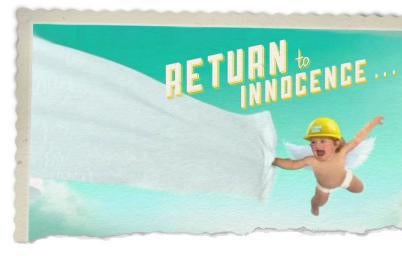This article is part of Postcards from Camp, a multi-part series on the nature and contemporary relevance of camp sensibility. Read all of the entries here.
In the previous post, we established the supremacy of the “reader” over the “author” when it comes to courting nuance, and thus rounded out something like a mechanics of camp. Going forward, we’ll take our theory on the road. First up, two favorite haunts of camp that have little to do with what we have been taught to appreciate as “campy”: innocence now, and in the next post, tragedy.
Regarding camp and innocence, we’d better start with a baby. An individual baby—yours, your co-worker’s, etc.—is a truly innocent thing, right? In fact, a real baby is so innocent as to be rather boring, lolling there in its bassinet. Using the notions we’ve developed thus far in this series, you might say that a real baby isn’t much of a “text”; its innocent banality renders it essentially uninteresting to camp. But the abstract idea of “babies,” on the other hand, is a very different story. Though you would be hard-pressed to find camp pleasure in a real-life baby perambulating down the sidewalk, when that same baby is featured in a toilet paper commercial flying about with wings and a hard-hat, all bets are off.
When camp runs headlong into this kind of calculated “Innocence”—anything that society dresses in wholesomeness, naiveté, common sense, earnestness, patriotism, sincerity, and much of what you might call kitsch—onlookers often mistake the result as an attack on the genuinely innocent. Sometimes they even act as if you slapped a baby.
New York Times restaurant critic Pete Wells learned this the hard way when he wrote an exhilaratingly camptastic pan of food celebrity Guy Fieri’s Times Square restaurant this past fall. Presented entirely in the interrogative mood, Wells’ review served up detail after harrowing detail, inviting us to pig out on an all-you-can-camp buffet—and it was delicious. To me, anyway. Because they misunderstood camp’s tendency to undercut Innocence as pure meanness, a larger number of readers found the review unwarranted and catty.
I can’t be sure, but I’m inclined to believe that Wells didn’t enter Guy’s American Kitchen and Bar planning to be a meanie. What I do know is that when he ran up against the ridiculous edifice of all-American, good ol’ boy, down-home diner mythology Fieri has cynically constructed on West 44th St., he forwent the typical critical responses of praise or scorn in favor of a third option, the camp option: Wells simply paid attention to nuance, both in his surroundings and on his plate and wrote them down, providing his readers with an opportunity for vicarious camp pleasure.
Some of those nuances bear reheating, like when Wells notes “how very far from awesome the Awesome Pretzel Chicken Tenders are” or asks, mimicking Fieri’s overblown, cool-dude diction, if such poor cooking is how “you roll in Flavor Town.” At one point, Wells wonders aloud whether Fieri takes the perfectly lovely “no collar” cuisine he has built his empire on seriously; but instead of answering that question himself, he allows the waiters to speak to it: “The well-meaning staff seems to realize that this is not a real restaurant.” Somewhere in Fieri’s gaudy, faux-Innocent façade of Americana, the plaster just cracked.
Of course, not all examples of Innocence are as cynical as Fieri’s. When I think of camp’s relationship to such things, I’m always reminded of an evening I spent camp-watching the Mormon Tabernacle Choir’s elaborate Christmas special on PBS. At some point, probably to the tune of “God Rest Ye Merry, Gentlemen,” a troupe of dancers in full Victorian garb skipped onto the stage to perform some of the gayest choreography I have ever witnessed. The scene was utterly breathtaking, and not in the way that the artistic director of the spectacle clearly intended. As I fixated on a ruddy, young Utahan spinning and stage-grinning (my nuance was somewhere between those facial expressions and his cravat), it occurred to me that to have put together this production without the slightest hint of irony, to present it to the world with earnest pride, the Mormon church’s investment in old-timey Innocence is so complete that our response to it must move beyond mockery to something more like pity.
This, of course, is a strange thing to feel for an organization that has traditionally been rather hostile to my own being. But then, pity bespeaks a position of condescension—and in that a certain kind of personal, if not political, power—doesn’t it? My camping of the Mormon Christmas special spared me from common feelings of hate or of being carried aloft by the rush of Innocent Christmas joy. No, it doesn’t undo the violence that this entity has done indirectly to me through its funding of Proposition 8, etc., but it does afford me the more immediate satisfaction of having my way with an object that wasn’t designed for my consumption (or at least, given the cravats, not consciously anyway). And better still, by undermining the Mormon Church’s hypocritical “Peace on Earth” claims to Innocence, camp allows for a certain, if limited, cutting-down-to-size, akin to when Nathan Lane (playing Chauncey Miles in the Broadway play The Nance) reduces the whole of Catholic hegemony to the pitiable vulgarity of wearing gold atop red velvet.
Camp’s inability to tolerate Innocence is not meanness; it’s a kind of survival mechanism. But if you think surviving Guy Fieri and the Mormon Church is hard, see what happens tomorrow when we look to camp to get us through the seriously tragic.
